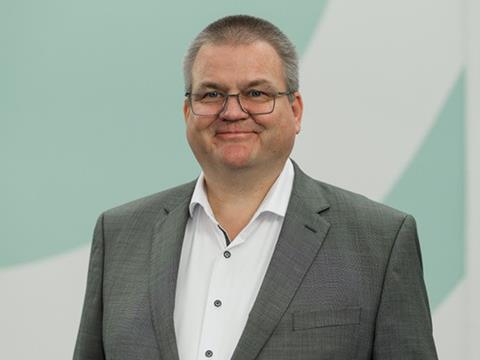
Global multi-participant project NEXTLOOPP, the overall winner of our 2021 Sustainability Awards, continues to gain momentum in its quest to close the loop on food-grade recycled polypropylene (FgrPP). Schur Flexibles, a leading European supplier of specialised flexible packaging solutions, has become the 39th organisation to join the project.
We talked with Dr. Martin Berlekamp, Schur Flexibles’ head of sustainability, to find out what drew Schur Flexibles to join the project.
Berlekamp started by pointing to the challenge the packaging sector faces in terms of a lack of high-quality recycled plastics. Whilst the industry certainly wants to become more sustainable it is hampered by the inability to identify and extract polyolefins from the mixed waste stream.
Schur Flexibles says it has a keen interest in the cutting-edge technologies developed by Nextek that NEXTLOOPP is deploying. These two technologies are PolyPRISM, which uses novel UV-fluorescent markers to identify and separate food-grade packaging and PPristine, a high-performance decontamination process that has reportedly been shown to remove all possible contaminants and comply with FSA, EFSA and USFDA food-contact migration test requirements.
As Berlekamp points out, being able to take PP from the mixed waste stream and turn it into food-grade material could be a game-changer and Nextek’s technologies apparently achieve precisely that.
In a bid to reduce its carbon footprint, Schur Flexibles claims to have looked at everything from raw materials such as bio-origin polymers to switching to alternative packaging systems.
So far, Berlekamp believes the most sustainable approach with the lowest carbon footprint is mechanical recycling, and he confirms that they already have a lot of interest from both brand owners and retailers.
Asked what other challenges his industry is facing, Berlekamp refers to the “gap” between the packaging industry’s evolution towards a circular economy and the economic impact of these solutions. As Berlekamp explains, all of us need to acknowledge that these vital changes are likely to have a cost, particularly in the early stages, but they are invaluable for the future of our planet.
NEXTLOOPP is part of the recycling ecosystem. Materials will be sourced via the domestic kerbside collection system and sorted via MRF’s to allow high collection rates from consumers. Berlekamp hopes that FgrPP will not only help reduce our carbon footprint, but will also boost the plastic sector’s image.
He also hopes that it can be a proof of concept that an authentic and sustainable circular economy is possible, even in the case of more awkward to recycle polymers, such as PP.
In the meantime, he says that brand owners need to be asking themselves some tough questions such as: what will a pack’s end-of-life be? Berlekamp continues: “We shouldn’t even start to give it shape until we know. The design of simplified packaging is needed to enhance recycling capacities. We can’t define increased collection until we tackle this. Brands have grown used to a sales model that focuses on discarding rather than recycling and the creation of a circular economy requires deep changes to be supported by brands and retailers.”
Finally, on a personal note, Berlekamp says that having worked for over two decades in the plastics packaging industry, he believes that Nextek’s Professor Edward Kosior is one of the few people who has sufficient in-depth knowledge of polymers and recycling processes to produce mechanically recycled polymers for food contact applications. He goes on to say that Kosior is driving the industry forward, which provides high confidence in the success of the NEXTLOOPP project.














No comments yet